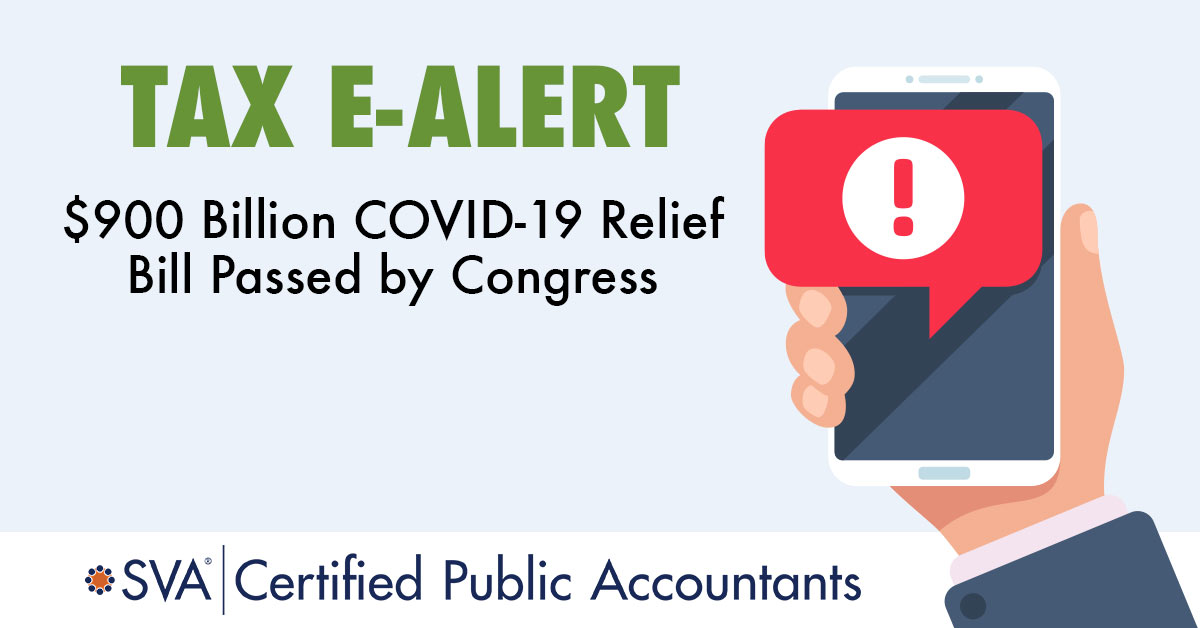It took months of contentious negotiations, but on the evening of December 21, Congress voted to approve a second stimulus package intended as a relief measure for businesses and individuals adversely affected by the COVID-19 pandemic. President Trump signed the bill on Sunday, December 27, 2020.
The $900 billion pandemic relief bill is the second largest federal stimulus after the Coronavirus Aid, Relief, and Economic Security (CARES Act), which was approved in March. Several aid packages under the CARES Act are set to expire December 31 and are now addressed in the new legislation. This new COVID-19 relief bill was combined with a massive $1.4 trillion federal government spending bill that will fund government programs through September 30, 2021.
The legislation includes direct stimulus checks of $600 to individuals and enhanced unemployment benefits, as well as nearly $300 billion of Small Business Administration (SBA) funding for the Paycheck Protection Program (PPP), which stopped taking loan applications in August.
The following summarizes highlights of the stimulus package.
Small Business Loans
$325 billion in aid is being provided to small businesses, including minority-owned businesses and nonprofits. In particular, the PPP program is being reopened with $284 billion in forgivable loans for small business borrowers, also making it possible for distressed businesses to get a second loan in an effort to remain afloat.
What businesses need to know about this second round of PPP funding:
- Maximum loan amounts of $2 million are being provided, with loans based on 2.5 months of payroll costs.
- The process around forgiveness for loans of $150,000 or less will be simplified.
- Forgivable expenses under the program will now include investments in facility modifications, PPE and other supplier costs that are necessary to operate safely through the pandemic.
- Expenses paid with PPP funds will be tax-deductible.
- The PPP retains a 60%/40% allocation between payroll and non-payroll costs for full loan forgiveness.
- $12 billion in additional PPP loans are available for minority-owned businesses and the smallest businesses through community development financial institutions, as well as a new Neighborhood Capital Investment program.
Additional small business measures include:
- $20 billion for Economic Injury Disaster Loans (EIDL) for businesses in low-income communities.
- $15 billion for live venues, independent movie theaters and other cultural organizations. Note that this also includes local newspapers, television and radio broadcasters.
- $3.5 billion will extend Small Business Administration (SBA) debt relief payments and $2 billion will be used to enhance SBA lending.
Businesses seeking additional PPP loans are advised to immediately prepare by gathering financial data to support their need for more funding.
Stimulus Payments
- The CARES Act provided individuals with $1,200 in stimulus checks. This new legislation provides half that amount, with one-time $600 stimulus payments sent to individuals with incomes up to $75,000 based on 2019 income. The amount of payments will be reduced by $5 for every $100 of income above those thresholds, and will phase out entirely for individuals earning over $87,000, compared to the CARES Act phase-out of $99,000.
- Eligible families will receive an additional $600 per child, which represents a $100 increase from the first round of relief funding.
- Stimulus checks should be distributed through direct deposit by the beginning of next week.
Employee Retention Tax Credit
- The relief package expands and extends the Employee Retention Tax Credit (ERTC) established under the CARES Act to assist small businesses and nonprofits in retaining their workers and continuing operations through the pandemic.
Unemployment Benefits
- Unemployed individuals will receive $300 per week in federal benefits for 11 weeks—from the end of December 2020 through mid-March 2021. This amount represents a 50% decrease from the first federal boost, which ran out by the end of July.
- Two other unemployment programs that were part of the CARES Act and were scheduled to expire this month have been extended:
- Jobless benefits are being expanded under the Pandemic Unemployment Assistance program to gig workers, independent contractors, freelancers, self-employed individuals and specific other people impacted by COVID-19.
- Individuals who exhaust their regular state benefits are eligible for an additional 13 weeks of payment under the Pandemic Emergency Unemployment Compensation program.
- Both programs will close to new applicants March 14, 2021 and phase out in early April for existing claimants.
Schools and Child Care
- K-12 schools and colleges will receive $82 million in relief aid, including assistance to help reopen classrooms safely.
- $10 billion is allocated to support childcare providers impacted by COVID-19.
Vaccine Funding
- $20 billion is being allocated to make vaccines available at no charge. Additionally, nearly $9 billion is being provided for vaccine distribution.
- More than $22 billion is available to states to assist with COVID-19 testing.
Rental Assistance and Evictions
- Eviction protection has been extended until January 31, 2021. It was previously set to expire December 31.
- An additional $25 billion in rental assistance is being provided for individuals who lost their source of income during the pandemic.
Food and Nutrition
- The legislation calls for Supplemental Nutrition Assistance Program (SNAP) benefits to be increased by 15% for six months.
- $400 million will be available to food banks and food pantries through The Emergency Food Assistance Program.
- $175 million will be available for senior nutrition services such as Meal on Wheels.
State and Local Funding
One of the most contentious issues of the stimulus negotiations, the $160 billion in funding to state and local governments, ultimately was not included in the final bill, as legislators opposing the measure argued that states were given $150 billion to use for COVID-19-related expenses in the first relief package. That said, state and local government leaders will have an additional year to spend the funding.
Do you have questions about the new $900 billion COVID-19 emergency relief bill? Please contact your SVA professional.



